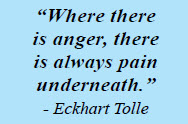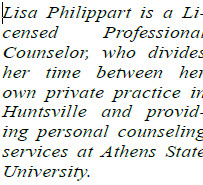A “Secondhand” Emotion – Mental Health Minute
 By: Lisa Philippart
By: Lisa Philippart
I am admitting that I have struggled with recognizing my own anger. I often don’t understand it when I feel it, and I sometimes don’t know what to do with it when it happens. So, I have become a master at talking myself out of whatever this feeling of anger is. But the more I counsel others, the more I discover the challenges of this emotion. The anger isn’t usually the problem, it’s often what is buried underneath and/or the action taken. Anger is a natural and mostly automatic response to pain, either physical or emotional. The dictionary definition is “a strong feeling of annoyance, displeasure, or hostility.” Anger tends to occur when we don’t feel well, we feel rejected, we feel threatened, or we experience a loss. The type of pain we feel is unpleasant, and because anger does not occur in isolation, it is often characterized as a “secondhand” emotion. The pain alone is not enough to cause the anger. Anger develops when pain and an anger-triggering thought combine.


As a cognitive-behavior therapist, I believe that our patterns of thought about the world and ourselves control our moods and our behaviors. Therefore, the thoughts that can trigger anger include our own personal assumptions and interpretations of situations that makes us think that pain will follow. Anger is definitely a complex social emotion. It seems that we always have a target for our anger, including ourselves. When something “bad” happens, we feel pain, combined with those anger-triggering thoughts, which then motivates us to take action. Anger is also second-handed in that it can be a substitute emotion. Have you ever changed your feelings of pain into anger? For some of us, it feels better to be angry than it does to be hurting. This changing of emotions from hurting into anger may be done consciously or unconsciously. The advantage of this substitution is primarily for distraction. If you are in pain, you generally think about the pain. But if you are angry, you tend to think about hurting whomever or whatever has caused the pain. The shift of your attention goes from focusing on yourself to focusing on someone or something else.

The feeling of anger does have its advantages. Anger temporarily protects us from having to recognize and deal with painful real feelings. Instead of focusing on the hurting, you get to think about getting back at the people or situations that created the discomfort. Or maybe your anger helps to hide a frightening situation and/or your vulnerability. Sometimes, becoming angry creates a feeling of righteousness and justice. You may be telling yourself that the people who hurt you are wrong and should be corrected or even punished. You train yourself to become angry with cause. If you can believe that your anger is justified and therefore so are your actions, you can better explain why you felt, thought, and acted a certain way. The problem becomes that the social judgment of our actions of anger creates real consequences for the angry person. You may believe that your anger “justifies” retaliation. The false feeling of righteousness, whether acceptable or not, offers a fleeting boost to self-esteem. I can attest to the fact that I find it more satisfying to acknowledge painful feelings through anger than to accept feelings of vulnerability. The bottom line here is that anger generally does not resolve or address the problems that make you feel afraid or exposed or hurting in the first place.
Next time, we will take a look at the ways anger may be harming your overall health.
By: Lisa Philippart
Licensed Professional Counselor</p>